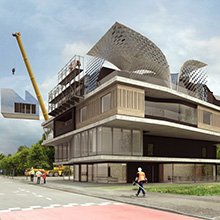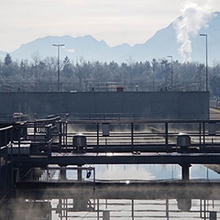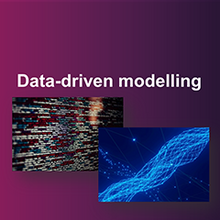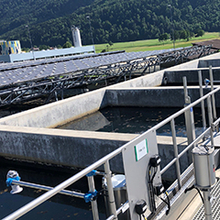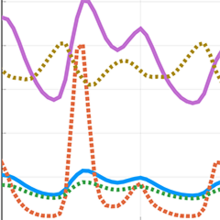Department Process Engineering
Project Overview
The research focus of the Process Engineering Department (ENG) ranges from current and future wastewater and drinking water treatment problems, as well as water pollution control and resource reuse. Our long-term goal is to develop sustainable concepts of the water and nutrient cycle in residential areas.
Projects
Projects organised per research groups
Drinking Water
Current projects
- Nanosorp - Nanosorp is a bilateral collaborative projects between several Polish partners (AGH, WUT) and Swiss partners (Eawag, EMPA), on the development and application of innovative filter- and membrane materials for water treatment.
- Regional Water Supply Baselland 21 - In this project, the qualitative and quantitative challenges of the water supply in the region Baselland are investigated. Activities in the group focus on the evaluation of existing and new technologies for water treatment. [...]
- Gravity driven membrane (GDM) - GDM is a simple, maintenance free technology which provides safe drinking water without the use of electricity and chemicals. GDM is also the core technology for Eawag’s concept of water treatment in the Reinvent the Toilet Challenge. [...]
- NEST - Sustainable urban water and wastewater management applied and implemented in the modular NEST building.
Completed projects
- Membrane fouling - Membrane fouling mechanisms by organic and inorganic water compounds
- In-line flocculation -In-line flocculation for the optimization of Ultrafiltration
- POU - Point-of-use treatment of drinking water by ultrafiltration and sand filtration
Wastewater
Current projects
- The Eawag Aerobic Granular Sludge (AGS) Model - Modelling of aerobic granular sludge (AGS) reactors
-
Granular activated carbon (GAC) filtration to abate micropollutants
- Data mining and visualisation of online data on wastewater treatment plants - New data mining algorithms shall be developed and existing methods shall be adapted in order to assist WWTP plant operators with information extracted from the large data set available. The systematic data exploitation will have positive impact on the environment and on treatment costs as well as on process understanding.
- N2O - Dynamic of greenhouse gas emissions in nutrient removing wastewater treatment plants.
- Nitrations-/Anammox process - Sludge liquid treatment with Nitritation/Anammox process.
- Production of fertilizer out of digester supernatant and urine - Recycle of nitrogen and phosphorus at the WWTP Kloten/Opfikon via combined air stripping (full scale experiments) and urine Treatment.
- ComFORMD (Combining Forward Osmosis with RO or Membrane Distillation for concentrating fouling feed streams): We are developing an integrated Forward Osmosis system coupled with Membrane Distillation or Reverse Osmosis for draw solution recovery to concentrate municipal wastewater. The project is a collaboration of Blue-tec Bv (NL), Fachhochschule Nordwestschweiz (NL), Waterschapsbedrijf Limburg (NL), Attero (NL), Solarspring (D), and Eawag. Eawag is focused on the treatment of the concentrate to recover nutrients and energy. The project is funded by Eurostars.
Completed projects
- Ozonation at the WWTP Neugut, Dübendorf – Monitoring and Control of Ozonation for Micropollutant Elimination by UV Absorbance Measurement.
- Reinvent the Toilet Challenge (RTTC) - The new toilet model will provide a sanitary solution that ensures human dignity and hygiene, while also being environmentally-friendly and economically feasible. A project in cooperation with EOOS and Makerere University in Uganda, funded by the Bill & Melinda Gates Foundation.
- ATHENE - Basics of biological removal of micropollutants. Designing new technical wastewater treatment solutions targeted for organic micropollutant biodegradation by understanding enzymatic pathways and assessing detoxification. An EU ERC Advanced Grant.
- NEPTUNE - New Sustainable Concepts and Processes for Optimization and Upgrading Municipal Wastewater and Sludge Treatment. EU Project.
- Strategie Micropoll - Mass-flux-study, Ozonation Regensdorf, powdered activated carbon.
- Powdered Activated Carbon (PAC) - PAC dosage to flocculation filtration of WWTP Kloten/Opfikon to improve micropollutant removal.
- HydroNET - Flotation instead of sedimentation - modular approach for small and medium WWTP.
- Heat recovery from wastewater - The higher-than-ambient temperature of wastewater makes it a valuable source of energy.
- Nitrite - Dynamics of nitrite in wastewater treatment plants.
- POSEIDON: Fate of pharmaceuticals and personal day care products in urban water treatment.
- Press technology - Innovative press technology for sewage sludge dewatering.
- EUROMBRA - Membrane bioreactor technology with an EU perspective for advanced municipal wastewater treatment strategies for the 21st century. EU project.
- RECLAIM WATER - Water reclamation technologies for safe artificial groundwater recharge. EU project.
Source Separation & Decentralisation
Current projects
- Melissa - Is a space research program, aiming to develop a bioregenerative life support system for long-term space missions and space habitations for example on Mars.
- VUNA - Valorisation of urine nutrients in Africa. By recovering nutrients from urine in small decentralised reactors, we want to develop a dry sanitation system, that is affordable for the poor, produces a valuable fertiliser, promotes entrepreneurship and reduces the pollution of water resources.
- Reinvent the toilet challenge (RTTC) - The new toilet model will provide a sanitary solution that ensures human dignity and hygiene, while also being environmentally-friendly and economically feasible. A project in cooperation with EOOS and Makerere University in Uganda, funded by the Bill & Melinda Gates Foundation.
- NEST - Sustainable urban water and wastewater management applied and implemented in the modular NEST building.
Completed projects
- STUN - Struvite recovery from urine in Nepal.
- Partial nitritation/anammox - Nitrogen removal from urine with partial nitritation / anammox.
- Electrochemical ammonia removal
- Wastewater in alpine areas - Decentralised treatment and reuse of toilet wastewater in alpine areas
- Single house - Single house wastewater treatment with water reuse
- SELF - Greywater treatment in the living module SELF [pdf 0.7 MB]
Application & Development
Currents projects
- Nutrients Recovery - Production of a fertiliser from wastewater - air stripping and membrane stripping.
- Biological post-treatment after ozonation for the elimination of micro pollutions.
- NEST - Sustainable urban water and wastewater management applied and implemented in the modular NEST building.
- Sludge treatment - Optimization of the sludge treatment (WWTP Neugut, Dübendorf)
- Ozonation - Monitoring and control of ozonation for the removal of trace elements by UV absorptiometry (WWTP Neugut, Dübendorf)
- Activated Carbon - Procedures for the application of activated carbon to remove trace elements municipal wastewater.
Completed projects
- Strategie Micropoll - Mass-flux-study, Ozonation Regensdorf, powdered activated carbon.
- Powdered Activated Carbon (PAC) - PAC dosage to flocculation filtration of WWTP Kloten/Opfikon to improve micropollutant removal.
- Wastewater in alpine areas - Decentralized treatment and reuse of toilet wastewater in alpine areas.
- Membranes - Use of membranes for municipal wastewater treatment.
- Press technology - Innovative press technology for sewage sludge dewatering.
Data & Information
Current Projects
- MAD4WW - Systematic investigation of hybrid model approaches for the prediction of nitrous oxide emissions in biological wastewater treatment
- SCENE - Reducing GHG emissions from wastewater treatment
- DyRPA - Dynamic control and process monitoring in wastewater treatment (Dynamische Regelung und Prozessüberwachung in der Abwasserreinigung)
- SoDAN - Soft-sensing, Diagnosis and Automation for Nutrient Recovery
- EMISSUN – Efficient Model Identification for Soft-Sensing of Urine Nitrification
Completed projects
- KTI Project - Innovative Methods for Wastewater Treatment Plant Optimization - Development of advanced adaptive software modules for SCADA systems to reduce energy and resources consumption.
- MAC-Nut - Model Adaptive Control for Nutrient removal and recovery processes.
Particle Laboratory
Current projects
- Behavior of silver nanoparticles in a wastewater treatment plant - Opportunities and Risks of Nanomaterials, National Research Programme NRP 64
- Nanodefine (FP7) - Development of full automation of electron microscopy operation allowing rapid particle sizing and elemental identification
- Fundamental and Applied Studies of Nanoparticle Detection using LIBD / LIBS - Laser Induced Breakdown Detection / Spectroscopy (SNF)
Completed projects
- Formation of Fe(III)-precipitates - Formation of Fe(III)-precipitates formed in aerated Fe(II) and As(III) containing water
- Particles (> 500 nm) in ice cores - Climatic indications of particles (>500nm) in Ice cores
- Laser Induced Breakdown Detection (LIBD) - Development of a Laser Induced Berakdown Detection (LIBD) system for fast on-line analysis of nanosized materials in the environment
- Engineered NP in the environment - Fate and behavior of engineered NP in the environment






